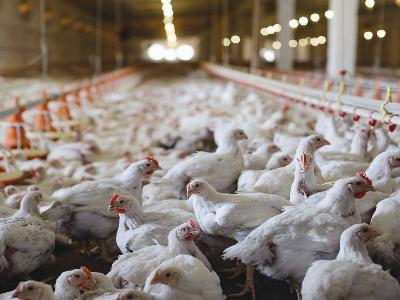Lessons learned switching corn to wheat in broiler diets

Ioannis Mavromichalis, Ph.D., gives his views on poultry, pig and dairy nutrition based on his experience as a nutrition consultant with clients around the world.
format35 | BigStockPhoto
Very recently, I again ran across a problem that I had to address back in 2009: a broiler producer reported severe loss of performance after a switch from corn to wheat. The broilers just refused to eat as much as they used to, and growth rates and feed efficiency were in the red.
A quick look at the formulas revealed nothing wrong; everything was balanced perfectly (to the credit of the nutritionist who did the work). But the broilers were not happy, to say the least. So, what was wrong?
As this was a long-distance consulting call, I asked for a sample of the wheat to be sent to me via post and two samples to be posted to chemical labs. I asked for the usual nutrient analysis, but I also included a mycotoxin profile (courtesy of a mycotoxin product supplier) and a pentosans analysis (courtesy of an enzyme supplier).
While waiting for the results, I asked for three changes in the formulas:
- Increase protein levels
- Add a broad enzyme cocktail
- Increase the level of mycotoxin binder
The birds started doing better, but performance was still not as before. Lab analyses showed that the wheat nutrient profile was in accordance with formulation expectations, so we took out the excess amino acids. The mycotoxin profiling revealed we were using the wrong product, so we switched to a more appropriate mycotoxin neutralizing agent. Finally, the pentosan analyses revealed intermediate levels, so we switched to a less expensive wheat-specific enzyme.
Suddenly, the broilers started doing fine, feed cost was back to acceptable levels, and a hard lesson was learned. Never assume changes in feed formulations are complete without taking into account non-nutrient considerations!
Ioannis Mavromichalis, Ph.D., is Nutrition Editor for WATTAgNet and Editor-in-Chief of Pig International.
Related news
 6 pullet feeding tips to increase egg production
6 pullet feeding tips to increase egg production Managing body weight for age is the key for maximizing lifetime performance in egg-layer pullets. A robust pullet will sustain peak productivity for longer
 5 broiler health priorities identified by USDA
5 broiler health priorities identified by USDA USDA’s National Institute of Food and Agriculture and Agricultural Research Service seek stakeholder input on what top broiler health research priorities should
 Broiler wet litter solutions through feed formulation
Broiler wet litter solutions through feed formulation Ioannis Mavromichalis, Ph.D, gives his views on poultry, pig and dairy nutrition based on his experience as a nutrition consultant with clients around the world